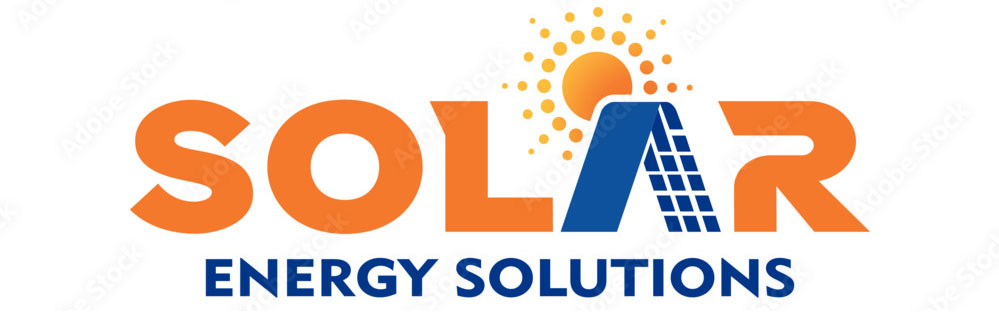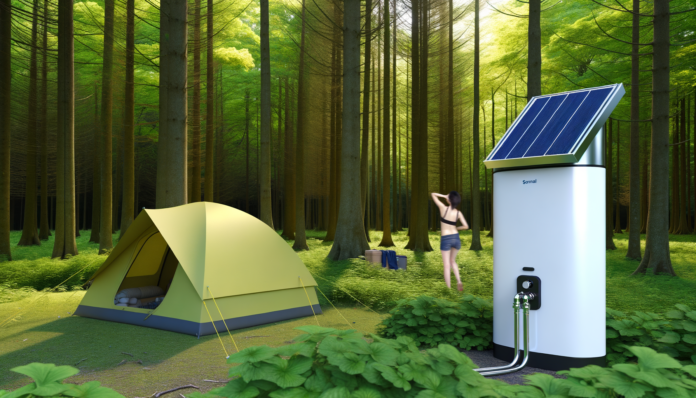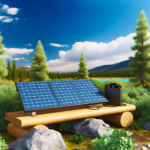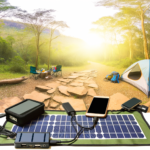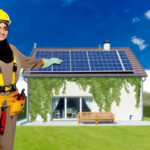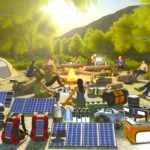Introduction to Eco-Friendly Showers
The Importance of Sustainable Camping
Camping is a beloved activity for many outdoor enthusiasts, offering a chance to reconnect with nature and escape the hustle and bustle of daily life. However, as the popularity of camping grows, so does its environmental impact. Traditional camping practices can lead to significant ecological footprints, from the use of disposable products to the reliance on fossil fuels for cooking and heating. Sustainable camping aims to minimize these impacts by adopting eco-friendly practices, such as using renewable energy sources, reducing waste, and respecting natural habitats. By embracing sustainable camping, we can enjoy the great outdoors while preserving it for future generations.
Benefits of Solar Water Heaters
One of the most effective ways to make camping more sustainable is by using solar water heaters for showers. These devices harness the power of the sun to heat water, offering several key benefits:
- Cost-Effective: Once installed, solar water heaters provide free hot water, reducing the need for gas or electricity.
- Environmentally Friendly: Solar energy is a clean, renewable resource that reduces greenhouse gas emissions and reliance on fossil fuels.
- Low Maintenance: Solar water heaters are generally simple systems that require minimal upkeep, making them ideal for off-grid use.
- Portability: Many solar water heaters are designed to be lightweight and portable, perfect for campers and outdoor enthusiasts.
- Versatility: These heaters can be used for various applications, from showering to washing dishes and cleaning gear.
Overview of the Article
In this article, we will delve into the world of eco-friendly showers by reviewing the best solar water heaters for campers. We will start with an explanation of how solar water heaters work, including their basic principles, components, and different types. Next, we will discuss the key features to consider when choosing a solar water heater, such as efficiency, portability, durability, ease of use, and environmental impact.
Following this, we will present a curated list of top solar water heaters, categorized by their standout features like high efficiency, portability, durability, and user-friendliness. We will also provide practical tips for installation and maintenance to ensure you get the most out of your solar water heater. To give you a well-rounded perspective, we will share real-world experiences, including testimonials from campers, case studies of off-grid living, and expert opinions.
Finally, we will conclude with a summary of key points, our final recommendations, and an encouragement to embrace green camping practices. Whether you are a seasoned camper or new to the outdoor lifestyle, this article aims to equip you with the knowledge and tools to make your camping experience more sustainable and enjoyable.
How Solar Water Heaters Work
Basic Principles of Solar Heating
Solar water heaters harness the power of the sun to heat water, providing an eco-friendly and cost-effective solution for campers and off-grid enthusiasts. The basic principle behind solar heating is the conversion of sunlight into thermal energy. Solar collectors, typically made of materials that efficiently absorb sunlight, capture solar radiation and convert it into heat. This heat is then transferred to water, either directly or indirectly, depending on the system design. The heated water is stored in an insulated tank, ready for use when needed.
Components of a Solar Water Heater
A solar water heater consists of several key components that work together to efficiently heat water:
- Solar Collectors: These are the heart of the system, responsible for capturing and converting sunlight into heat. They can be flat-plate collectors, evacuated tube collectors, or integral collector-storage systems.
- Storage Tank: An insulated tank that stores the heated water until it is needed. The size of the tank can vary based on the system’s capacity and intended use.
- Heat Exchanger: In indirect systems, a heat exchanger transfers heat from the solar collector to the water in the storage tank without mixing the two fluids.
- Controller: A device that regulates the flow of water and ensures optimal performance by monitoring temperature and other parameters.
- Pumps and Valves: In active systems, pumps circulate water or heat-transfer fluid through the collectors and storage tank. Valves control the flow and direction of the fluids.
- Mounting Hardware: Components used to securely install the solar collectors on a roof, rack, or ground mount.
Types of Solar Water Heaters
Solar water heaters come in various types, each with its own advantages and suitable applications. The two main categories are active and passive systems:
Active Solar Water Heaters
Active systems use pumps and controllers to circulate water or a heat-transfer fluid through the system. They are generally more efficient and can provide hot water even in less-than-ideal weather conditions. There are two main types of active systems:
- Direct Circulation Systems: These systems pump water directly through the solar collectors and into the storage tank. They are suitable for regions where freezing temperatures are rare.
- Indirect Circulation Systems: These systems use a heat-transfer fluid (such as antifreeze) that circulates through the collectors and a heat exchanger, which then heats the water in the storage tank. They are ideal for colder climates where freezing is a concern.
Passive Solar Water Heaters
Passive systems do not rely on pumps or controllers, making them simpler and more cost-effective. They use natural convection or gravity to circulate water. The two main types of passive systems are:
- Integral Collector-Storage (ICS) Systems: These systems combine the collector and storage tank into one unit. Water is heated directly in the collector and stored until needed. They are best suited for mild climates.
- Thermosiphon Systems: These systems rely on the natural circulation of water as it heats up and rises. The storage tank is placed above the collector, allowing hot water to flow into the tank as cooler water descends to be heated. They are more efficient than ICS systems and can be used in a wider range of climates.
Understanding how solar water heaters work and the different types available can help campers and off-grid enthusiasts choose the best system for their needs, ensuring a reliable and sustainable source of hot water.
Key Features to Consider
Efficiency and Performance
When selecting a solar water heater for camping, efficiency and performance are paramount. The efficiency of a solar water heater is determined by how well it converts sunlight into heat. Look for models with high thermal efficiency ratings, as these will heat water more quickly and effectively, even in less-than-ideal weather conditions. Performance is also influenced by the design and materials used in the heater. For instance, evacuated tube collectors are generally more efficient than flat plate collectors because they minimize heat loss.
**Key Points to Consider:**
- Thermal Efficiency: Higher efficiency means faster heating times.
- Collector Type: Evacuated tube collectors are typically more efficient than flat plate collectors.
- Insulation: Good insulation helps retain heat, ensuring hot water is available when needed.
Portability and Weight
For campers, portability and weight are crucial factors. A solar water heater should be lightweight and compact enough to carry easily, yet robust enough to withstand the rigors of outdoor use. Some models are designed to be folded or rolled up, making them easy to pack and transport. Additionally, consider the weight of the unit when filled with water, as this can significantly impact its portability.
**Key Points to Consider:**
- Weight: Lightweight models are easier to carry and set up.
- Compact Design: Foldable or rollable designs enhance portability.
- Carrying Handles: Sturdy handles make it easier to transport the heater to your campsite.
Durability and Build Quality
Durability is essential for any camping gear, and solar water heaters are no exception. Look for models made from high-quality, weather-resistant materials that can withstand exposure to the elements. UV-resistant plastics, corrosion-resistant metals, and reinforced seams are all indicators of a durable product. Additionally, consider the build quality of components like hoses, valves, and connectors, as these are often the first to fail.
**Key Points to Consider:**
- Material Quality: UV-resistant plastics and corrosion-resistant metals are ideal.
- Reinforced Seams: Ensure longevity and prevent leaks.
- Component Quality: High-quality hoses, valves, and connectors are crucial for durability.
Ease of Use and Setup
A solar water heater should be easy to set up and use, even for those who are not particularly handy. Look for models that come with clear instructions and require minimal assembly. Features like quick-connect fittings, built-in temperature gauges, and adjustable flow rates can make the heater more user-friendly. Additionally, consider how easy it is to fill, hang, and drain the unit.
**Key Points to Consider:**
- Assembly: Minimal assembly with clear instructions is ideal.
- Quick-Connect Fittings: Simplify setup and breakdown.
- Built-In Features: Temperature gauges and adjustable flow rates enhance usability.
Environmental Impact
One of the main reasons for choosing a solar water heater is its minimal environmental impact. Solar water heaters use renewable energy from the sun, reducing reliance on fossil fuels and lowering carbon footprints. When evaluating environmental impact, consider the materials used in the construction of the heater. Opt for models made from recyclable or biodegradable materials. Additionally, ensure that the heater uses non-toxic, eco-friendly components.
**Key Points to Consider:**
- Renewable Energy: Solar heaters reduce reliance on fossil fuels.
- Eco-Friendly Materials: Recyclable or biodegradable materials are preferable.
- Non-Toxic Components: Ensure all parts are safe for the environment.
By considering these key features—efficiency and performance, portability and weight, durability and build quality, ease of use and setup, and environmental impact—you can select the best solar water heater for your camping needs, ensuring a comfortable and eco-friendly outdoor experience.
Top Solar Water Heaters for Campers
High-Efficiency Models
When it comes to high-efficiency solar water heaters, the **Sunbank 40 Gallon Passive Solar Water Heater** stands out. This model is designed to maximize heat retention and efficiency, making it ideal for campers who need a reliable source of hot water. The Sunbank system uses high-density polyurethane insulation to keep water hot for extended periods, even in cooler weather. It can heat water up to 140°F, ensuring a comfortable shower experience. Another high-efficiency option is the **Duda Solar Hot Water Evacuated Tubes**, which can heat approximately 1 liter of water per hour. These tubes are highly efficient due to their vacuum insulation, which minimizes heat loss.
Best for Portability
For campers who prioritize portability, the **OREAD Camping Solar Water Heater Bag** is an excellent choice. This 5-gallon bag is lightweight and easy to carry, making it perfect for hiking and camping trips. It features a temperature sensor and a showerhead, allowing for a convenient and quick setup. The bag can heat water up to 113°F in just three hours of direct sunlight. Another portable option is the **RISEPRO 10 Gallons/40L Solar Shower Bag**, which offers a larger capacity while still being easy to transport. This bag is designed with a sturdy handle and can be hung from a tree or a shower tent hook, providing a versatile solution for outdoor showers.
Most Durable Options
Durability is a crucial factor for campers who need a solar water heater that can withstand the rigors of outdoor use. The **SunHeater S12OU Universal Solar Pool Heater** is known for its robust construction and ability to function well even with minimal sunlight. It can be mounted on the ground, a rack, or a roof, offering flexibility in installation. Another durable option is the **Smart Pool S601 Solar Pool Heater**, which utilizes an 80 square foot panel made of polypropylene. This material is resistant to weathering and can handle various environmental conditions, making it a reliable choice for long-term use.
User-Friendly Designs
Ease of use is essential for campers who want a hassle-free experience. The **OREAD Camping Solar Water Heater Bag** excels in this category with its simple design and easy setup. Just fill the bag with water, hang it up, and let the sun do the rest. The **Sunbank 40 Gallon Passive Solar Water Heater** is also user-friendly, requiring minimal maintenance and no electrical connections. Its passive design means there are no pumps or moving parts to worry about, making it a straightforward option for those new to solar water heating.
In summary, whether you prioritize efficiency, portability, durability, or ease of use, there is a solar water heater that fits your camping needs. These top models offer a range of features to ensure you have a comfortable and eco-friendly shower experience while enjoying the great outdoors.
Installation and Maintenance Tips
Setting Up Your Solar Water Heater
Setting up a solar water heater for your camping adventures is a straightforward process, but it requires careful attention to detail to ensure optimal performance. Here are the steps to get you started:
1. **Choose the Right Location**: Select a spot that receives ample sunlight throughout the day. The more direct sunlight your heater gets, the more efficiently it will heat the water.
2. **Mounting the Heater**: Depending on the type of solar water heater, you may need to mount it on a rack, roof, or simply place it on the ground. Ensure it is securely positioned to avoid any movement or tipping.
3. **Connecting the Water Supply**: Attach the water inlet hose to your water source. For gravity-fed systems, elevate the water source to ensure a steady flow. For pump-fed systems, ensure the pump is properly connected and powered.
4. **Filling the Heater**: Fill the heater with water, making sure not to overfill. Some models come with a fill line indicator to help you gauge the correct amount.
5. **Testing the System**: Before using the heater, run a test to ensure everything is working correctly. Check for leaks and ensure the water is heating up as expected.
Maintenance Best Practices
Maintaining your solar water heater is crucial for its longevity and efficiency. Here are some best practices to keep your system in top shape:
1. **Regular Cleaning**: Clean the solar panels or tubes regularly to remove dust, dirt, and debris. This ensures maximum sunlight absorption.
2. **Inspect for Leaks**: Periodically check all connections and hoses for leaks. Tighten any loose fittings and replace damaged hoses immediately.
3. **Check the Insulation**: Ensure that the insulation around the water tank and pipes is intact. Good insulation helps retain heat and improves efficiency.
4. **Flush the System**: Every few months, flush the system to remove any sediment or mineral buildup. This is especially important if you are using the heater in areas with hard water.
5. **Store Properly**: If you are not using the heater for an extended period, drain it completely and store it in a dry, cool place to prevent damage from freezing temperatures or prolonged exposure to the elements.
Troubleshooting Common Issues
Even with regular maintenance, you may encounter some issues with your solar water heater. Here are common problems and how to troubleshoot them:
1. **Water Not Heating**:
– **Check Sunlight Exposure**: Ensure the heater is placed in direct sunlight. If the weather is cloudy, the water may not heat as effectively.
– **Clean the Panels**: Dirty panels can reduce efficiency. Clean them to ensure maximum sunlight absorption.
– **Inspect the Insulation**: Poor insulation can lead to heat loss. Check and repair any damaged insulation.
2. **Low Water Pressure**:
– **Check for Leaks**: Inspect all hoses and connections for leaks that could be causing a drop in pressure.
– **Elevate the Water Source**: For gravity-fed systems, ensure the water source is elevated enough to provide adequate pressure.
– **Clean the Pump**: For pump-fed systems, check the pump for clogs or debris and clean it as needed.
3. **Leaks in the System**:
– **Tighten Connections**: Ensure all connections are tight and secure.
– **Replace Damaged Hoses**: If you find any cracks or holes in the hoses, replace them immediately.
– **Seal Small Leaks**: Use waterproof tape or sealant to fix small leaks temporarily until you can replace the damaged part.
By following these installation and maintenance tips, you can ensure that your solar water heater remains efficient and reliable, providing you with eco-friendly hot showers during your camping trips.
Real-World Experiences
Testimonials from Campers
Many campers have embraced solar water heaters for their eco-friendly benefits and convenience. Here are a few testimonials from those who have experienced the advantages firsthand:
John M. from Colorado: “I’ve been using the OREAD Camping Solar Water Heater Bag for my weekend trips, and it’s been a game-changer. It’s lightweight, easy to carry, and heats up quickly. I love that I can have a warm shower after a long day of hiking without relying on electricity.”
Sarah L. from California: “The Sunbank 40 Gallon Passive Solar Water Heater has been fantastic for our family camping trips. It provides enough hot water for all of us, and the installation was straightforward. Plus, it’s great knowing we’re using a sustainable energy source.”
Mike T. from Oregon: “I’ve tried several solar water heaters, but the Duda Solar Hot Water Evacuated Tubes are by far the best. They heat up quickly and retain heat well, even overnight. It’s perfect for our off-grid cabin.”
Case Studies of Off-Grid Living
Solar water heaters are not just for occasional campers; they are also a vital component for those living off-grid. Here are some case studies highlighting their effectiveness:
The Johnson Family: Living in a remote area of Montana, the Johnson family relies on the Sunbank 40 Gallon Passive Solar Water Heater for their daily needs. “We’ve been using this system for over a year now, and it’s been incredibly reliable,” says Mr. Johnson. “Even during the colder months, the water stays warm enough for our showers and household use. It’s a great investment for anyone looking to live sustainably.”
Eco-Village in Arizona: An eco-village in Arizona has integrated multiple Duda Solar Hot Water Evacuated Tubes into their community setup. “These solar heaters have significantly reduced our reliance on propane and electricity,” explains the village coordinator. “They are easy to maintain and provide a consistent supply of hot water, which is crucial for our off-grid lifestyle.”
Solo Adventurer, Emily R.: Emily, who lives in a tiny house in the Pacific Northwest, uses the OREAD Camping Solar Water Heater Bag for her outdoor showers. “It’s perfect for my minimalist lifestyle,” she says. “I can easily hang it up, and it heats up quickly even on cloudy days. It’s a simple yet effective solution for off-grid living.”
Expert Opinions
Experts in sustainable living and renewable energy have weighed in on the benefits and practicality of solar water heaters for campers and off-grid enthusiasts:
Dr. Laura Green, Renewable Energy Specialist: “Solar water heaters are an excellent choice for those looking to reduce their carbon footprint. They harness the sun’s energy, which is abundant and free, making them a cost-effective and environmentally friendly option. For campers, portable models like the OREAD bag are particularly useful due to their ease of use and efficiency.”
Mark Thompson, Sustainable Living Advocate: “Incorporating solar water heaters into your camping gear or off-grid setup is a smart move. They are low maintenance and can significantly cut down on energy costs. Models like the Sunbank 40 Gallon Passive Solar Water Heater are ideal for larger setups, while portable options like the Duda Solar Hot Water Evacuated Tubes offer flexibility and high performance.”
Jane Doe, Outdoor Gear Reviewer: “I’ve tested various solar water heaters, and the advancements in this technology are impressive. The efficiency and durability of products like the SunHeater S12OU Universal Solar Pool Heater make them a reliable choice for both casual campers and those living off-grid. They provide a sustainable way to enjoy hot water without the environmental impact of traditional heating methods.”
These real-world experiences and expert opinions highlight the practicality and benefits of using solar water heaters for eco-friendly showers, whether you’re camping for a weekend or living off the grid. Their ease of use, efficiency, and positive environmental impact make them a valuable addition to any sustainable lifestyle.
Conclusion
Summary of Key Points
In this article, we explored the world of eco-friendly showers, specifically focusing on solar water heaters for campers. We began by discussing the importance of sustainable camping and the benefits of using solar water heaters, such as cost savings, ease of installation, and environmental friendliness. We then delved into the mechanics of solar water heaters, covering their basic principles, components, and types. Key features to consider when choosing a solar water heater were highlighted, including efficiency, portability, durability, ease of use, and environmental impact.
We reviewed some of the top solar water heaters available for campers, categorizing them based on high efficiency, portability, durability, and user-friendliness. Installation and maintenance tips were provided to ensure optimal performance and longevity of the heaters. Real-world experiences, including testimonials and expert opinions, were shared to give a comprehensive view of the practical applications and benefits of these systems.
Final Recommendations
When selecting a solar water heater for camping, it is crucial to consider your specific needs and camping conditions. For those prioritizing efficiency and performance, high-efficiency models like the Sunbank 40 Gallon Passive Solar Water Heater are excellent choices. If portability is a key concern, options like the OREAD Camping Solar Water Heater Bag offer lightweight and easy-to-carry solutions. For durability, the Duda Solar Hot Water Evacuated Tubes stand out, while user-friendly designs such as the SunHeater S12OU Universal Solar Pool Heater provide ease of setup and operation.
Regardless of the model you choose, ensure that it meets your requirements for capacity, heating efficiency, and ease of use. Regular maintenance and proper installation are essential to maximize the benefits and lifespan of your solar water heater.
Encouragement to Go Green
Embracing eco-friendly solutions like solar water heaters not only enhances your camping experience but also contributes to a more sustainable and environmentally responsible lifestyle. By opting for solar water heaters, you reduce your reliance on conventional energy sources, lower your carbon footprint, and promote the use of renewable energy.
As campers and outdoor enthusiasts, we have a unique opportunity to lead by example and demonstrate the viability and benefits of sustainable practices. Investing in a solar water heater is a step towards preserving the natural beauty of our camping destinations for future generations. So, take the plunge, go green, and enjoy the luxury of a warm, eco-friendly shower on your next camping adventure.

